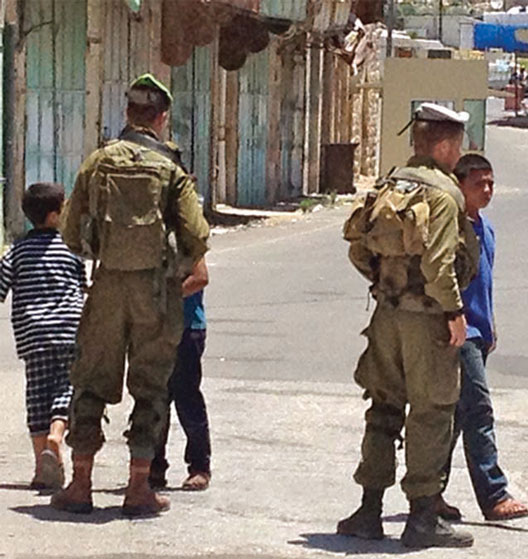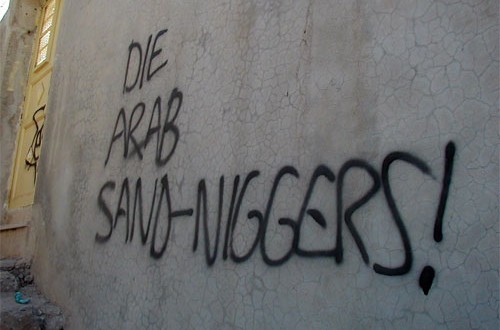
As Iraq and Syria disintegrate, the world watches with great trepidation. The group that once referred to itself as the Islamic State of Iraq and Syria (ISIS) now simply calls itself the Islamic State. This new self-professed Caliphate claims sovereignty over not just a significant chunk of land in the Middle East, but over all of the world’s Muslims.
In the 21st century, the idea of a country existing exclusively for the fundamentalist ideologues of one religion seems archaic. The violence being used to create this “state” further separates it from modern ideals.
And yet for all the concern and outrage expressed about the Islamic State, there is another country just a few hundred miles away that subscribes to a similar worldview: the self-proclaimed “Jewish State” of Israel.
Claiming—by right of divine election—to be the homeland of all the world’s Jews, Israel purports to be fulfilling the will of God. Both the Jewish State and the Islamic State rely on propaganda and religious texts in an effort to legitimize their existence and call their brothers and sisters living abroad to come “home.” Both were conceivedthrough (and continue to perpetrate) abhorrent acts of violence. Followers of both ideologies see themselves as victims of global persecution.
While imperfect, such a comparison—on any level—would likely send ardent Zionists into a tizzy. Israel, in their view, is a modern, civilized nation surrounded by ruthless Arabs hell-bent on eradicating Jews. Arabs deploy terrorists, they maintain, while Israel is forced to respond with measured violence for security reasons. In their minds, Israel is an island of sophistication in a sea of savagery.
Many Israeli Jews our delegation met with proudly and confidently shared such sentiments.
Commented Sheldon Schorer, an attorney and dual citizen of Israel and the United States: “If you take away all the guns from the Israelis, there would be a slaughter. If you took all the guns away from the Arabs, there would be peace.”
U.S.-born Israeli Ardie Geldman, who lives in the illegal West Bank settlement of Efrat, used even harsher words to describe his Palestinian neighbors. “If they, meaning the Palestinians, were capable of doing to us what we are capable of doing to them, none of us would be here,” he said, quoting an Israeli newspaper. “They would annihilate us all, left and right, religious and secular, industrialists and farmers, each and every one of us. We live side by side with a vile monster that has malicious intentions and limited abilities.”
Given these “malicious intentions,” many Zionist Jews believe Palestinians simply can’t be trusted to act humanely. “You would never find a Jewish lady who could go to the Arab hospital here in Hebron and come out alive,” maintained a Jewish settler who confronted our group while it was walking the streets of Hebron in the southern West Bank. Jews, on the other hand, can be trusted to act morally, she argued: “When I gave birth in Jerusalem, [the hospital] was all filled with Arab ladies, and they got the best treatment.”
This strain of supremacist rhetoric repeated by many Zionist Jews is similar to the language deployed by other colonists throughout history. In Latin America, Japan, North America, Australia and elsewhere, one can read countless documents written by the founders of new nations describing the need to “tame” and “civilize” the “barbaric” indigenous peoples they encountered.
A Colonial Outlook

And just like the Spaniards in Latin America or the British in Australia, many Zionists believe their rhetoric is factual and their displays of force are necessary. They point to isolated incidents such as the 1929 massacre of 67 Jews in Hebron or the recent kidnapping and killing of three young Israelis as definitive proof that beyond the borders of Israel there are masses of Arabs waiting to slaughter Jews. They insist such overwhelming military assaults as “Operation Protective Edge” in Gaza are necessary because force is the only language understood by the natives, who lack a set of modern moral standards.
While spouting such rhetoric, most Zionists claim to be blissfully ignorant of (or even deny) the many injustices carried out by the Israeli government or their fellow citizens against Palestinians. Take for instance, this statement by the aforementioned settler in Hebron: “Even now with the kidnapped people, [Israel] doesn’t go shut [Palestinian] electricity, they don’t close their water, nothing.”
Such a claim, of course, could not be further from the truth. During times of war and “peace” alike, Israel frequently restricts Palestinian access to basic necessities such as water and electricity.
The Emergency Water Sanitation and Hygiene group, a coalition of 27 organizations working to provide the residents of Gaza access to clean water, has reported that Israel has deliberately targeted Gaza’s water infrastructure during “Operation Protective Edge.” As a result, they warn, access to clean water is sparse and sewage is overflowing into Gaza’s crowded streets.
Al-Monitor reports that Israel also has purposely restricted Gaza’s access to electricity. The online publication notes that Israel intentionally destroyed most of Gaza’s electrical transformers when it launched its ground offensive on July 17. As a result, Gaza’s electricity outages now last longer than 21 hours a day.
Such tactics are also frequently deployed in the West Bank. Some West Bank villages receive water intermittently (if at all), while their settler neighbors enjoy lush gardens and large swimming pools. Indeed, last year the Palestinian human rights organization Al-Haq released a report finding that an estimated 113 Palestinian communities are not connected to a water network. The report also found that Palestinian access to water has decreased 20 percent since the Oslo II peace accords were signed in 1995.
Even within its own territory, Israel denies more than 40 “unrecognized” Bedouin villages in the Negev and the Galilee access to water or electricity. These villages, incidentally, only exist because the Israeli government forced certain Bedouin tribes off their native lands in order to build Jewish-only communities.
Overlooking such inconvenient facts, Zionists and the Israeli government are able to easily claim the moral upper hand. “We are so human to them, too human for them,” the settler from Hebron insisted. “You don’t find [unprovoked acts of violence] on the other [Israeli] side. You just don’t.”
The reality is that Jewish Israelis regularly commit acts of violence against Palestinians. This is especially true in the settler’s own city of Hebron, where one can witness some of the gravest injustices being carried out against the Palestinians.
Portions of the historic Palestinian market in Hebron’s old city are covered with nets that protect shoppers from the garbage regularly thrown at them by Jewish settlers. Several Palestinian homes in the city have sustained severe fire damage as a result of settler attacks. Israeli authorities regularly ban the call to prayer at the city’s historic Ibrahimi mosque, which Muslims can only access by passing through an Israeli security checkpoint—one of 101 such checkpoints in the city.
Hebron is also home to Shuhada Street, perhaps the eeriest stretch of pavement in all of Israel and Palestine. Once home to prosperous Palestinian shops, the street is now barren. The 420 or so settlers who live in Hebron are the only people permitted to enter portions of the street.
Standing at the center of the street at midday on Friday, one feels as though he is in the middle of a ghost town being used as a military training facility. IDF solders encircle the area. Settlers are in their homes, hidden from sight, observing Shabbat behind barbed wire fences. Shuttered storefronts are everywhere, some covered with signs erected by settlers explaining the violent nature of Arabs. The young Palestinian boys in the distance being yelled at by soldiers for trying to enter the street are the only indication of life. The street is completely void of the soul it once had. It is deprived of humanity.
Is Shuhada Street Israel’s idea of civility? Is this really the settlers’ definition of being “too human”? If Israelis, and particularly their settlers, are such advanced and moral people, how does one account for the many physical and verbal manifestations of intolerance and bigotry one finds throughout the country?
Walid Abu-Hallawa, director of public relations at the Hebron Rehabilitation Committee, describes Hebron’s settlers as “abnormal people.” Typical individuals, he reasons, would never willingly create or move into such a hostile and depressing environment. “Normal people like to live in an area where there is life, shops, supermarkets, schools, restaurants,” he said. These settlers, however (many of whom are from New York), choose to live surrounded by 1,500 soldiers, carry automatic weapons down the street and live in contempt of their neighbors.
According to Ardie Geldman, human values “are foreign to the [Palestinian] monster next door and [they] certainly don’t feel obliged to uphold them.” A 21st century man with a degree in sociology ought to know that such 19th century colonial rhetoric will not advance the cause of peace and justice.
If Israel is going to get serious about peace, it must do what it demands of its “enemy”: conform to modern morals. In the meantime, it can take consolation in the fact that its ideology is hundreds of years ahead of the “Islamic State,” which is looking to re-establish a system of government that died in 1258.
Articles in this section expresses the opinion its author only
 العربي الديمقراطي The Latest From The Arab World
العربي الديمقراطي The Latest From The Arab World





